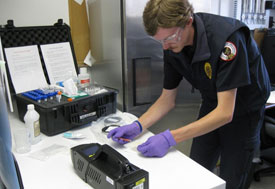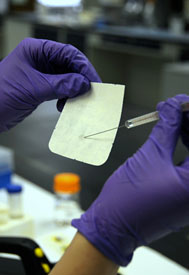Because of a lapse in government funding, the information on this website may not be up to date, transactions submitted via the website may not be processed, and the agency may not be able to respond to inquiries until appropriations are enacted. The NIH Clinical Center (the research hospital of NIH) is open. For more details about its operating status, please visit
cc.nih.gov. Updates regarding government operating status and resumption of normal operations can be found at
opm.gov.
FDA evolves to meet global regulatory challenges
November / December 2012 | Volume 11, Issue 6

Photo courtesy of the FDA
The U.S. Food and Drug Administration is
evolving to provide global leadership to combat
production and shipment of poor-quality drugs
and other products.
Consumers everywhere need protection from counterfeit or harmful medicines, especially in the developing world where there is often little manufacturing oversight or capacity to monitor the marketplace. The U.S. Food and Drug Administration (FDA) is evolving to meet the regulatory challenges caused by surging international trade, to ensure product safety both at home and abroad.
"We live in a globalized world," said FDA Commissioner Margaret Hamburg. "We need to create a global coalition of regulators that enables us to work together in a much more coordinated way," she recently told a Center for Strategic and International Studies conference in Washington, D.C.
Consumers are increasingly vulnerable, she said, citing several "real-world, wake-up calls" in various countries over the past few years. These include the appearance of contaminants in the blood-thinning drug Heparin, the industrial chemical melamine in baby formula and the solvent diethylene glycol in cough syrup.
Many developing countries, with limited funds for regulatory activities, are particularly challenged as they try to deal with fake or diluted drugs for life-threatening diseases such malaria. "Sadly, a lot of the medications being used to treat malaria are substandard and they're not only not treating and curing malaria, but they're adding to the growing problem of drug resistance, because they don't have adequate levels of the active pharmaceutical ingredient," Hamburg said.
Improving regulatory capacity in low-resource settings brings valuable benefits in addition to consumer protection, she noted. It promotes economic development by creating stable, more reliable industries, from local farming to generic drug manufacturing. It also improves the health and well-being of citizens and, in turn, can influence a country's political system. "On many levels, your investment in regulatory capacity is fulfilling health needs, economic development needs and, in some cases, political stability," Hamburg said.
Although the FDA is not a development agency, its efforts have an impact on public health activities. For example, by ensuring the quality of drugs and devices delivered to developing country patients with HIV/AIDS, the FDA is protecting the investments made by the President's Emergency Plan for AIDS Relief. Similarly, stronger regulatory systems and deeper knowledge about global supply chains can help regulatory authorities collectively to better ensure the safety and quality of products for patients and consumers around the globe.
As the FDA is expanding its reach to colleagues in the development community, including the WHO, it is assisting others in building global regulatory capacity. It's also increasing partnerships with industry, which has a stake in improving the quality and integrity of products it wants to sell.
In a recent study focused on Africa, the FDA and USAID investigated pharmaceutical quality and monitoring, suggesting ways to fill the gaps. And the Institute of Medicine recently produced a study, Ensuring Safe Foods and Medical Products Through Stronger Regulatory Systems Abroad, identifying the steps needed to develop regulatory systems in developing countries and how the FDA and other regulators can contribute.
The FDA's increased global perspective came out of necessity. About 24 million product lines come into the U.S. each year, quadruple the number of a decade ago. In the area of drugs, four-fifths of active pharmaceutical ingredients come from abroad, as do two-fifths of shelf-ready drugs consumed by U.S. consumers.

Photo courtesy of the FDA
The FDA is working to increase
scientific capacity in developing
countries to improve the quality
and safety of the global drug
supply.
"We no longer view ourselves as a domestic agency; we believe that we have to be a global agency with a global mission," Hamburg said. "We simply have to have new models [that] build on the notion of partnership both with other regulatory authorities and with industry to raise standards and also share information in new ways."
Regulators should form new coalitions and develop systems for working together, including technology that enhances data sharing and facilitates risk-based analyses. "We need to be able to use the best science, the best experience and expertise, to target the highest risk products and to use our resources in ways that will make the greatest difference," she said.
To make the most of limited funds, regulators should be strategic in where they direct resources, for instance, by focusing on vulnerabilities in a product's supply chain or scrutinizing drugs intrinsically at elevated risk of being falsified, Hamburg said.
Meanwhile, the NIH and FDA have pledged to work more closely to speed research discoveries. They are collaborating on an initiative to fast-track scientific breakthroughs to the public and developing a chip that can more quickly gauge if a new drug compound has potential to improve health.
The two agencies have also awarded more than $10 million for studies of nanoparticles, a heart-lung model to test drug safety and effectiveness, an innovative clinical trial design and a new strategy to predict eye irritation.
Increased cooperation around the world is in the best interests of everyone, including the U.S. "It means that those products that are coming from outside our borders will be of higher quality," she said. And, she added, the U.S. benefits by finding ways to "effectively share the workload."
Hamburg concluded that the FDA is committed to tackling the challenges of its global mission. "Anyone who's working at the FDA, whether it's working on the science, inspection or compliance side, feels the tug and pressures of globalization."
More Information
To view Adobe PDF files,
download current, free accessible plug-ins from Adobe's website.